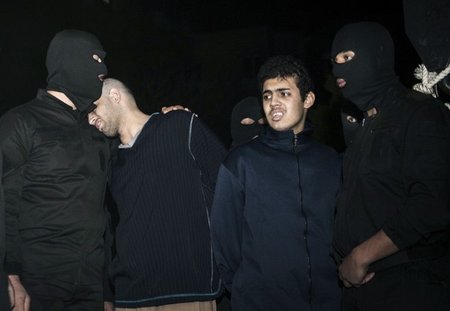
The indispensable Thomas Erdbrink describes the scene at a public hanging in Tehran:
'An eerie silence filled the air as a crowd of around 300 gathered Sunday just before sunrise in a Tehran park. They awaited the arrival of two young men who were about to die.The condemned stood shoulder to shoulder, motionless, in front of two police trucks with two nooses hanging from extendable cranes, about 15 feet high. Black-clad executioners were inspecting the remote controls they would use to hang the men, both in their early 20s, who were convicted of stabbing a man in November and stealing his bag and the equivalent of $20.
From behind a makeshift barrier of scaffolding, the crowd jostled for position. â??Letâ??s move to the other side,â? one spectator whispered to his wife, pointing to the spot where Iranian state television cameras had been set up. â??I think we will have a better view from there.â?Â
'
Capital punishment is certainly not unique to Iran, but it's the nature of the crime -- and the government's response -- that makes this story so gripping:
'Many in Tehran applauded the harsh sentence for Mr. Mafiha and Mr. Sarvari, saying they hoped that it would make criminals think twice about attacking people. But others doubted that would happen.â??The number of quarrels, suicide, murder and crime are all up,â? Amanollah Qaraei Moghadam, a sociologist, recently wrote on Mellat Online, an Internet news site. â??It is 100 percent clear the situation will not change unless the economy improves.â?Â
'
Brendan Daly provides some broader context:
'This time last year, it was still very rare to hear the word â??tahrimâ? (sanctions) on the streets of Iranian cities. Now you hear it every day. Not to mention the latest anecdotes of the dollar-rial exchange rates.At the height of the currency crisis in October, when the rial had dropped to 20 percent of its value compared to last year, a convenience store in downtown Tehran rather humorously put up a sign saying â??No discussion of the dollar rate!â? As I presented my wares and the shopkeeper saw my Western face, he asked me if I could pay in dollars.
Street crime in Tehran has, by all accounts, risen exponentially over the past few years. I am told that ten years ago such occurrences as this brutal mugging â?? as well as the increasingly popular act of pretending to be a taxi driver in order to rob passengers at knife-point â?? were very rare.
More surprisngly perhaps, from around 10:30pm on most nights, on the major boulevard nearest to my apartment, young girls can be seen openly soliciting. To the uninitiated, they are simply well-dressed girls waiting to be picked up by friends. But there is a very specific, very subtle dress code â?? and if you stay around to observe, you will see them negotiating with men through their car windows. Again, I am told that this was unheard of only five or six years ago.
'
I've defended sanctions against Iran in the past, but at some point the U.S. must distinguish between tactic and strategy in its handling of the Islamic Republic. As the West continues to pile on sanctions, it's the Iranian people who continue to suffer.
The Iranian government of course bears most of the blame in all of this. The theocratic junta in Tehran has politically, psychologically and -- and times -- violently repressed its own people so much, and for so long, that Iranian drug abuse is reportedly at an all-time high. Creativity, individuality, curiosity -- such traits are deemed, at best, as out of step with societal mores, and at worst seditious. Economic transition, coupled with economic incompetence, has only exacerbated the problem, as Iranians suffering through one long crisis are now faced with a slew of more pressing crises brought on by sanctions, mismanagement and isolation.
Perhaps this is all just collateral damage in the ongoing cold war between Iran and the United States, but, at some point, the West may have to reckon with its own role in bringing the Iranian people to their knees.
(AP Photo: Alireza Mafiha, second left, leans his head on the shoulder of a security officer moments before his execution along with Mohammad Ali Sarvari, second right, in Tehran, Iran, Sunday, Jan. 20, 2013. Iran executed two men on Sunday publicly, after posting a video on YouTube in December 2012 showing them robbing and assaulting a man with a machete on a street in Tehran.)
